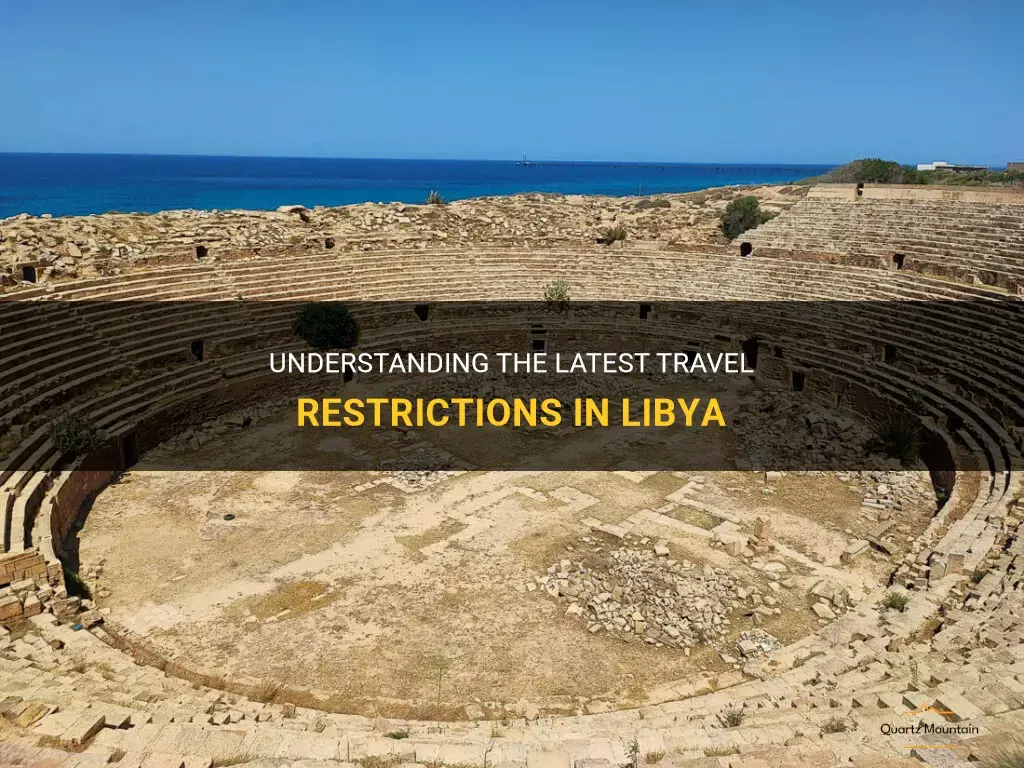
Are you planning a trip to Libya? If so, you might want to be aware of the current travel restrictions that are in place. Due to political instability and security concerns, many countries have issued travel advisories for Libya. These restrictions can range from a complete ban on travel to certain areas, to recommendations to exercise caution and stay updated on the situation. In this article, we will explore the various travel restrictions in Libya and provide you with some tips on how to navigate them. So, if you're considering a trip to this fascinating country, keep reading to ensure a smooth and safe journey.
What You'll Learn
- What are the current travel restrictions in place for Libya?
- Are there any specific countries that have been banned from traveling to Libya?
- What are the requirements for entering Libya during the pandemic?
- Are there any quarantine or testing requirements for travelers arriving in Libya?
- Are there any exceptions to the travel restrictions for humanitarian or essential purposes?

What are the current travel restrictions in place for Libya?

As of the current situation, travel restrictions are in place for Libya due to the ongoing political instability and security concerns in the country. The situation in Libya has been volatile ever since the 2011 revolution that overthrew former dictator Muammar Gaddafi. There have been conflicts between various factions and armed groups, resulting in a fragmented and fragile security environment.
The travel restrictions for Libya vary depending on the country and region. Many countries have issued advisories against all travel to Libya due to the high risk of terrorism, kidnapping, and armed conflict. Some countries have even closed their embassies and consulates in Libya, limiting the consular assistance available to their citizens.
Commercial flights to and from Libya have also been significantly reduced due to safety concerns. The main international airport in Tripoli has been closed at times due to security threats, making it difficult for travelers to enter or leave the country. The airports in Benghazi and Misrata have also experienced disruptions and closures.
Land borders with neighboring countries may be subject to closures or restrictions, making overland travel to and from Libya challenging. The situation can change rapidly, and travelers are advised to check with their local embassy or consulate for the latest information and travel advice.
In addition to the security concerns, there are also health risks associated with travel to Libya. The country has limited medical infrastructure and resources, and the ongoing COVID-19 pandemic has further strained the healthcare system. Travelers are advised to follow all health and safety guidelines, including wearing masks, practicing physical distancing, and regularly washing hands.
For those who are currently in Libya and need assistance, it is important to reach out to your country's embassy or consulate for support. They can provide information on evacuation options and other necessary assistance.
It is important to note that the situation in Libya is fluid and can change rapidly. Travelers should stay updated with the latest information and travel advisories before planning any trips to Libya. It is strongly advised to consider postponing travel to Libya until the security situation improves and restrictions are lifted.
How Hawaii's Travel Restrictions Act as a Booster for Local Tourism
You may want to see also

Are there any specific countries that have been banned from traveling to Libya?
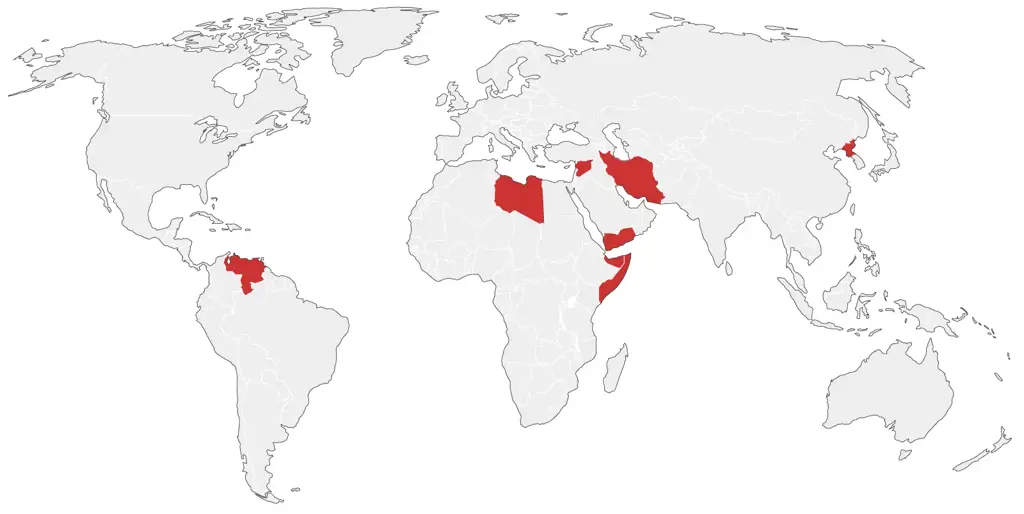
Yes, there are specific countries that have been banned from traveling to Libya. The ban is mostly due to security concerns and ongoing conflicts in the region. The current list of banned countries includes the following:
- Syria: Due to its ongoing civil war and presence of extremist groups, Libya has banned travel from Syria. The country is considered a high-security risk and poses a threat to the stability of Libya.
- Yemen: Similar to Syria, Yemen is also facing a civil war and has a high level of violence and instability. Travel from Yemen is banned to prevent the infiltration of extremist groups and to maintain security in Libya.
- Somalia: Somalia is known for its long-standing conflict and the presence of various militant groups. The ban on travel from Somalia is aimed at preventing the entry of individuals who may have ties to these groups and to maintain stability within Libya.
- Afghanistan: Afghanistan is another country that has been banned from traveling to Libya. It has a history of conflicts and is a known stronghold for extremist groups. To prevent the entry of individuals who may have affiliations with these groups, Libya has imposed a ban on travel from Afghanistan.
- Iraq: Iraq is currently facing security challenges due to ongoing conflicts, especially with the presence of ISIS (Islamic State of Iraq and Syria). As a result, Libya has banned travel from Iraq to avoid any potential security threats.
It is important to note that the ban on travel to Libya from these countries is subject to change depending on the security situation in the region. Travelers are advised to stay updated with the latest travel advisories and consult with their respective embassies or consulates before planning any trips to Libya.
In addition to these specific bans, there may also be visa restrictions or additional security measures imposed on travelers from other countries with security concerns. Therefore, it is recommended to check with the Libyan embassy or consulate in your home country before planning a trip to Libya. It is always better to be well-informed and prepared before traveling to any foreign country.
Understanding Air Force Travel Restrictions: Navigating Top Secret Clearance Protocols
You may want to see also

What are the requirements for entering Libya during the pandemic?
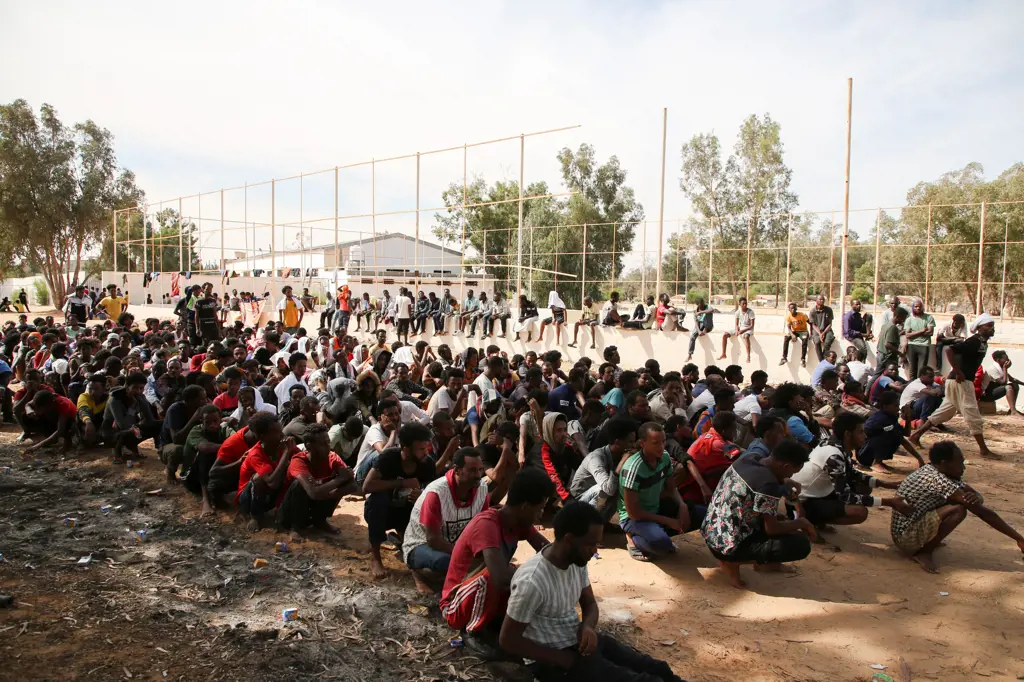
Libya, like many other countries around the world, has implemented measures to control the spread of COVID-19. These measures include restrictions on international travel and requirements for entering the country during the pandemic. If you are planning to travel to Libya, it is important to be aware of these requirements to ensure a smooth and hassle-free entry.
First and foremost, it is essential to check the latest travel advisories and guidelines issued by the Libyan government and the World Health Organization (WHO). These advisories will provide information on the current COVID-19 situation in Libya, any travel restrictions in place, and the requirements for entering the country.
Currently, all travelers entering Libya are required to present a negative PCR test result for COVID-19. The test must be taken no more than 72 hours before the scheduled departure time. The test must be conducted at an authorized laboratory and the result must be presented in either English or Arabic.
In addition to the negative PCR test result, all travelers entering Libya must fill out a health declaration form. This form will gather information about your recent travel history, contact details, and any COVID-19 symptoms you may be experiencing. The form may vary depending on the mode of transportation you are using to enter the country (e.g., air travel, land border crossing), so it is important to obtain and complete the correct form.
Upon arrival in Libya, travelers will undergo health screening, which may include temperature checks and additional testing if deemed necessary by the authorities. Travelers with symptoms or a positive test result may be subject to quarantine or isolation measures as prescribed by the Libyan health authorities.
It is important to note that travel restrictions and requirements may change at short notice depending on the evolving COVID-19 situation in Libya. Therefore, it is essential to stay updated with the latest information from reliable sources such as government websites, international embassies, and health organizations.
Before traveling to Libya, it is also advisable to have travel insurance that covers medical expenses and potential COVID-19 related expenses. This will provide you with financial protection in case of any unforeseen circumstances during your trip.
In conclusion, entering Libya during the pandemic requires travelers to present a negative PCR test result taken within 72 hours of departure, fill out a health declaration form, and undergo health screening upon arrival. It is important to stay updated with the latest travel advisories and guidelines and have travel insurance that covers COVID-19 related expenses. By adhering to these requirements and staying informed, you can ensure a safe and hassle-free journey to Libya.
Exploring Antigua: Current Travel Restrictions and Guidelines
You may want to see also

Are there any quarantine or testing requirements for travelers arriving in Libya?
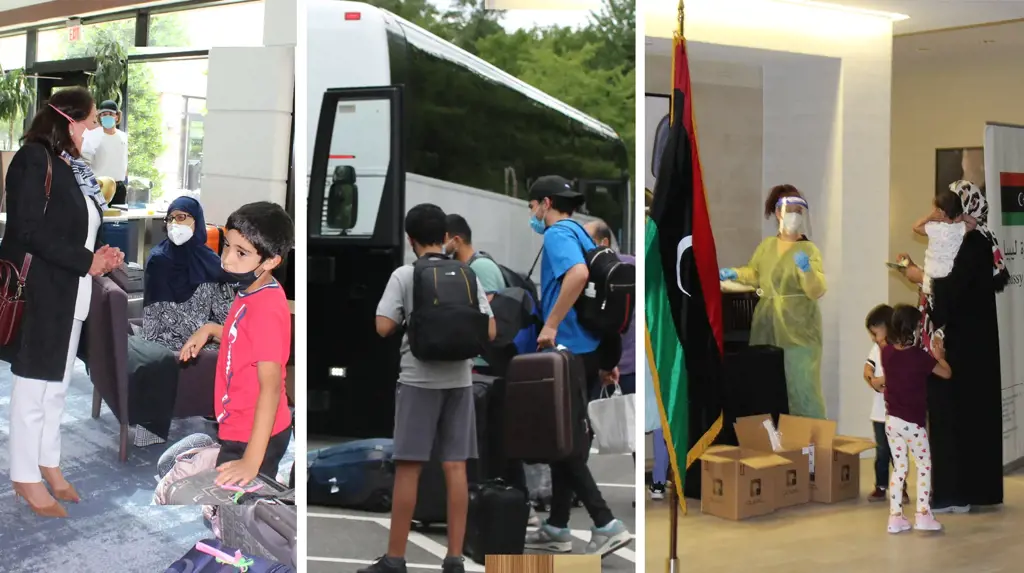
As of now, there are no specific quarantine or testing requirements for travelers arriving in Libya. However, due to the ongoing COVID-19 pandemic, the Libyan authorities have implemented several general measures to prevent the spread of the virus.
It is recommended for all travelers to adhere to the following guidelines:
Pre-Travel Requirements:
- Before traveling to Libya, it is essential to check the latest travel advisories and restrictions imposed by the Libyan government or relevant authorities.
- Travelers should ensure they have valid travel insurance that covers COVID-19-related medical expenses.
COVID-19 Testing:
- Although there are no specific testing requirements for entry into Libya, it is advisable for travelers to get tested for COVID-19 before their departure.
- Some airlines may require a negative COVID-19 test result before allowing passengers to board the aircraft. Therefore, it is essential to check with the airline regarding their specific requirements.
Health Declaration:
Upon arrival in Libya, travelers may be required to fill out a health declaration form. This form typically includes information about any COVID-19 symptoms, recent travel history, and contact details.
COVID-19 Safety Measures:
- Travelers should follow all recommended COVID-19 safety measures, including wearing masks, practicing good hand hygiene, and maintaining social distance.
- It is advisable to carry enough hand sanitizer and face masks for personal use during the trip.
Stay Informed:
As the situation regarding COVID-19 is constantly evolving, it is crucial for travelers to stay updated with the latest guidelines and recommendations from local health authorities.
It is important to note that the situation regarding COVID-19 can change rapidly, and new measures or restrictions may be imposed by the Libyan government at any time. Therefore, it is essential to check for any updates and follow the guidance provided by the relevant authorities.
Travelers should also consider the potential risks associated with travel during the pandemic and evaluate the necessity of their trip to Libya. It is advisable to consult with healthcare professionals or travel health advisors before planning any travel.
In conclusion, while there are no specific quarantine or testing requirements for travelers arriving in Libya, it is important to follow general guidelines and recommendations to prevent the spread of COVID-19. Staying informed, practicing good hygiene, and adhering to any local measures will help ensure a safe and healthy trip.
Chile Travel Restrictions Update: What You Need to Know
You may want to see also

Are there any exceptions to the travel restrictions for humanitarian or essential purposes?
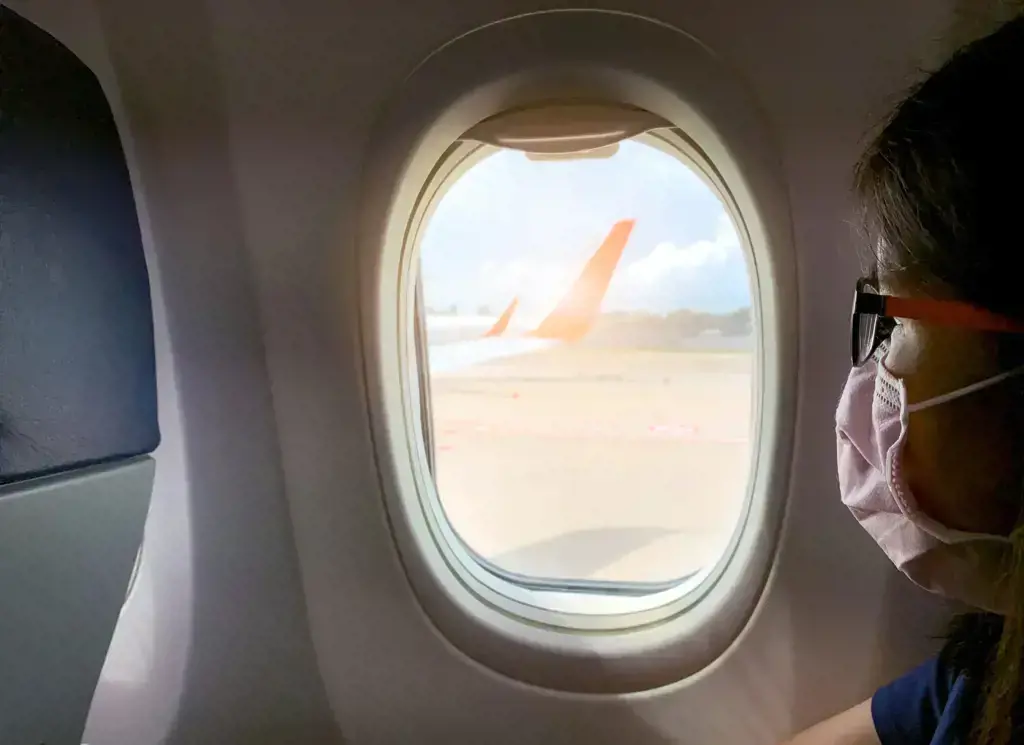
In response to the ongoing pandemic, many countries have implemented travel restrictions to protect their citizens' health and prevent the spread of COVID-19. These restrictions often include limitations on non-essential travel and require individuals to have a valid reason for crossing international borders. However, there are some exceptions to these travel restrictions for humanitarian or essential purposes.
Humanitarian travel is often permitted, even during times of a global crisis like the COVID-19 pandemic. This type of travel includes situations where individuals need to provide aid, support, or relief to those affected by natural disasters, conflicts, or other emergencies. Humanitarian workers from international organizations, non-governmental organizations (NGOs), and government agencies may be able to obtain special permits or exemptions to travel to affected areas.
Similarly, essential travel exceptions may also be granted to individuals or groups with critical roles in maintaining societal and economic functions. This can include healthcare professionals, emergency responders, essential workers in certain industries such as food and agriculture, transportation, energy, and public safety. These individuals may need to travel for work purposes or to provide necessary services in countries or regions affected by the pandemic.
However, it is important to note that the criteria for humanitarian or essential travel exceptions can vary from country to country, and even within different regions within a country. It is crucial to stay updated with the latest travel advisories and guidelines from relevant government authorities to understand the specific requirements and procedures.
In many cases, individuals seeking to travel for humanitarian or essential purposes may be required to provide appropriate documentation or evidence to support their request. This can include official invitation letters, employment contracts, medical certifications, and other relevant documents. It is advisable to contact the respective embassy or consulate of the destination country for detailed information on the specific requirements and processes.
Additionally, individuals granted exceptions for humanitarian or essential travel may still be subject to additional health and safety measures upon arrival, such as quarantine or testing protocols. It is important to be aware of these measures and to comply with them accordingly to protect oneself and others.
In conclusion, while most countries have implemented travel restrictions to control the spread of COVID-19, there are exceptions for humanitarian or essential purposes. Such exceptions typically apply to individuals involved in providing aid, support, or critical services in areas affected by emergencies or requiring essential services. It is important to stay informed about the specific requirements and processes for obtaining exemptions and to comply with any additional health and safety measures upon arrival.
The Latest Air Travel Restrictions in Ghana: What You Need to Know
You may want to see also
Frequently asked questions
Yes, there are travel restrictions for Libya. The country is currently facing a political and security situation, which has resulted in several areas being unsafe for travel. The U.S. Department of State has issued a Level 4 Travel Advisory, advising against all travel to Libya due to the ongoing conflict and threat of terrorism.
It is currently extremely difficult to obtain a visa to travel to Libya. The country's diplomatic missions are closed, and the issuance of visas has been suspended. Additionally, many airlines have halted their flights to Libya, making it challenging to travel to the country even if you do have a visa.
No, it is not safe to travel to Libya at this time. The country is experiencing a volatile security situation, with ongoing conflict and the presence of armed militias. There is a high risk of terrorist attacks, kidnappings, and civil unrest. Foreigners, including tourists, are at particular risk of being targeted.
Yes, there are restrictions on the types of items you can bring into Libya. The country has strict import regulations, and some items may be prohibited. It is advised to check with the Libyan Embassy or consulate in your country for the most up-to-date information on the import restrictions and requirements before you travel to Libya.







